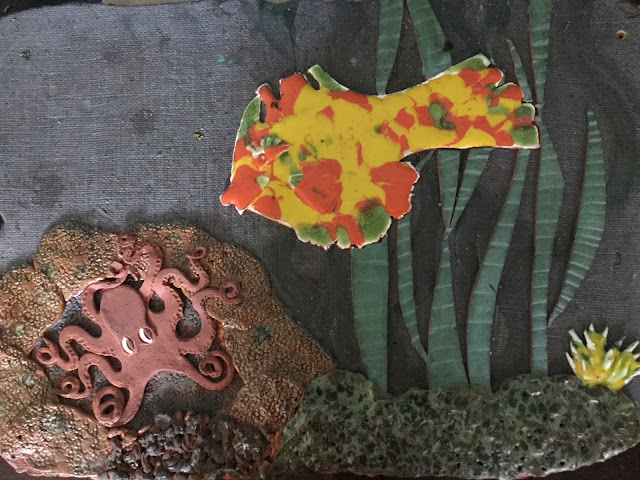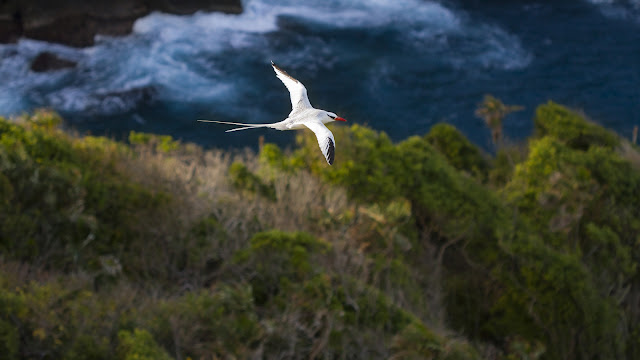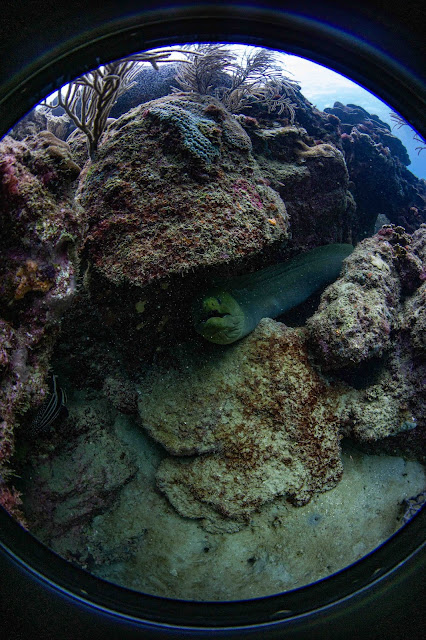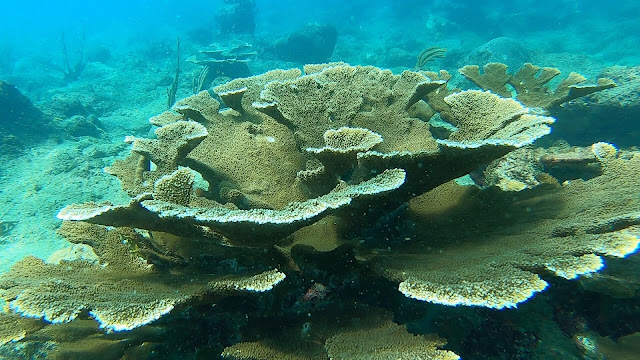Plastics in our Ocean World
On
June 8, celebrate World Oceans Day with your own thanksgiving and tribute to
the waters that surround Tobago: a sea bath, a beach lime, a coastal clean up,
an exploration along a nearby shore. For the rest of the year, adopt some of
these practices to protect and conserve the ocean from where you live and work. (First published in Newsday Tobago, June 7, 2018)
The artist who created the clay plaque
called “Famous Fish meets the King of Undersea World,” Bunty O’Connor, says
that our familiarity and dependence on plastic – especially single use plastic
– happened in the recent three decades. This is the story of her artwork, “That
famous fish was a mylar balloon, the first I had seen. It floated up on Madamas
beach (on Trinidad’s north coast) maybe 32 years ago. We were camping with the
children. And hard to imagine, no plastic on the beach back then. I can also
remember my first plastic red soap package floating in the sea in
Charlotteville, maybe the same time or a little earlier. I was shocked and had
the first glimmerings of doom and gloom.”
Today, in 2018, World Oceans Day (June
8) is dedicated to “preventing plastic pollution, and encouraging solutions for
a healthy ocean.” Some 30 years since the Famous Fish of O’Connor’s artwork, we
hear stories of great islands of garbage,
mainly plastic, in all the oceans. It is estimated that a dump truck full of
plastic goes into the ocean every minute. Eventually, unless we can turn the
tide on trash, there may be more plastic in the sea than fish.
World Oceans Day was first observed in
2002 as World Ocean Day, led by the
Ocean Project, an independent network of organisations. After all, there is one
global interconnected Ocean that connects all life on earth; albeit with
different names for distinct bodies of water, the Pacific Ocean, Atlantic
Ocean, Indian Ocean, Arctic Ocean, and Southern Ocean. All belong to One Ocean.
The Ocean Project is a strategic
communications organization with a global network of over 2000 partners from
all sectors, including youth networks, aquariums, zoos, museums, schools,
universities, maritime industry, dive groups, surfers, sailors, businesses,
communities of faith, government agencies, celebrities, and many more. It is led by a core team of marine and
conservation scientists, supported by advisory councils. The Ocean Project promoted
“World Ocean Day” and added the “s” after the United Nations General Assembly passed
a resolution in late 2008 officially recognizing June 8 as World Oceans
Day. Perhaps one day, the world will acknowledge and embrace the singular
“Ocean;” until then, let us observe the UN-designated World Oceans Day in
solidarity for the conservation of this important resource that connects us
all.
How will you celebrate World Oceans
Day? Here are some thoughts.
If you are in school, you can encourage
awareness of the biggest problem for the Oceans through discussion of Plastic
Pollution. If you are a teacher, download an easy lesson plan here:
http://www.worldoceansday.org/plastic-pollution-lesson-plan
If you are students, discuss the
problem and take action. What plastic items have you used today? List them.
Which will be used once and discarded? Whether they are used once or over and
over, all plastic goes to landfills, to drains, streams, rivers and out to the
sea. Do you know where your discarded plastic items go? Is there a useful
recycling programme that your school or community or home might use to dispose
of your soap bottles, water bottles, plastic packaging? What are alternatives
to plastic?
How can you take action in your
community? Consider asking restaurants and other businesses to go plastic free.
Bring your own reusable or cloth bags to the grocery or market, say no to
plastic bags from suppliers. Avoid single use plastics, food containers,
beverage containers, plastic straws.
YOUR COMPANY ACTION PLAN
Companies can help to remove plastics from their operations, and they can also offer other considerations for the health of the oceans, marine fauna and coral reefs. Companies are encouraged to take action, but also to influence their significant stakeholders:
Companies can help to remove plastics from their operations, and they can also offer other considerations for the health of the oceans, marine fauna and coral reefs. Companies are encouraged to take action, but also to influence their significant stakeholders:
·
Engage employees and co-workers
·
Involve your customers
·
Reach out to the community
An action plan for companies, restaurants, hotels, groceries and vendors:
Adopt environmentally friendly practices;
work against pollution. Reduce waste, especially plastic pollution, and ensure
proper disposal of waste (electronics, batteries etc). Recycle and re-purpose
(glass, metals and plastics) as much as possible.
Educate staff on adopting eco friendly
lifestyles with reward/ bonus programmes for reducing waste in projects and in
their personal lives. For example, replace plastic bag use with reusable bags;
limit plastic bottle usage by providing water dispensers. Encourage employees
to adopt practices that reduce carbon footprints: carpool, limit AC usage,
limit dryer usage, walk or bicycle instead of driving, turn off office lights
at night, reduce printing.
Work against climate change. Waste reduction goes hand in hand with curbing your carbon emissions footprint. Establish climate change policies to reduce carbon emissions and waste while streamlining productivity.
Educate communities (families, schools) about the value of coral reefs and conserving their environment. Coral reefs are indicators of global warming and climate change. In Tobago, we are very fortunate to lie within the 1% of ocean floor where coral reefs may be found. Support communities and youth groups to learn about human impacts on the ocean and on coral reefs. Support coral reef research. (Pat Ganase)
Work against climate change. Waste reduction goes hand in hand with curbing your carbon emissions footprint. Establish climate change policies to reduce carbon emissions and waste while streamlining productivity.
Educate communities (families, schools) about the value of coral reefs and conserving their environment. Coral reefs are indicators of global warming and climate change. In Tobago, we are very fortunate to lie within the 1% of ocean floor where coral reefs may be found. Support communities and youth groups to learn about human impacts on the ocean and on coral reefs. Support coral reef research. (Pat Ganase)



